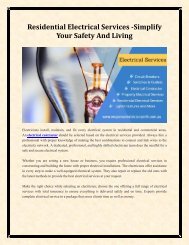RCDs - Everything An Perth Electrician Should Know
And this sufficient in order to avoid any injury caused by electrocution and stay out of the risk zone. Thus, a residual current device acts as an important safety device in houses and even save the expenses spent on costly electrical services in case of any failure. The device works on the current balance principle.
And this sufficient in order to avoid any injury caused by electrocution and stay out of the risk zone. Thus, a residual current device acts as an important safety device in houses and even save the expenses spent on costly electrical services in case of any failure. The device works on the current balance principle.
You also want an ePaper? Increase the reach of your titles
YUMPU automatically turns print PDFs into web optimized ePapers that Google loves.
RCDs: Everything An Perth Electrician
Should Know
Nowadays, fitting an RCD has become a necessity for every house. Wait! Are you even
aware of the term RCD? Don’t have any idea about it? Well, in this post, we will discuss
what RCD (Residual Current Device) is, what are its benefits, its different types, and how
it acts as a safer approach for daily lives. Well, let’s get started!
Understanding RCD
A residual current device is an important safety device that is designed to stay safe
against the risk and is essential in every home. A residual current device continuously
monitors the electrical current flow throughout the circuit. The device is even helpful in
sensing if there are any faults present in the electrical system by turning off the flow of
electricity on an automatic basis. And this sufficient in order to avoid any injury caused
by electrocution and stay out of the risk zone. Thus, a residual current device acts as an
important safety device in houses and even save the expenses spent on costly electrical
services in case of any failure. The device works on the current balance principle.
Types of RCD Protection
Broadly, there are three types of RCD protection: fixed RCDs, portable RCDs, and socket
RCDs. Let’s discuss them in detail:
Fixed RCDs
Fixed RCDs can be easily found in the consumer unit and offers protection to individuals
or even a group of circuits. Deploying a fixed RCD in a consumer unit i.e. fuse box that
offers you the complete protection for the house. The RCD Electrical regularly monitors
and protects every single component of the circuit and detects all the faults that might
arise in-between.
Portable RCDs
Offering an alternative to socket RCDs, these kinds of adapters are easy and simple to
use and interchangeable for locations. It plugs in any sort of the standard socket outlets,
which is then plugged into the appliance you are using. These types of RCDs are
commonly used for outdoor appliances, like lawn mower and hedge trimmer.
Socket RCDs
Socket RCD is a type of specially designed plug socket that has an in-built RCD. These
RCDs are different from the standard RCDs and have different functionalities. A socket
RCD protects the person who is in contact with an appliance plugged into the RCD
socket.
How Can RCD Circuit Breakers Help You?
The easiest way to get a residual current device in your house is to fit RCD in the
consumer unit and avoid the dangers during any faults. This helps you minimize the risk
of electric shocks and possible fire damages to the house that might occur due to faulty
wiring or unearthed appliances. They are designed carefully with high protection in
order to avoid electrocution or electrical fires.
Relying on RCD circuit breakers can help you prevent circuit overloads as they regularly
monitor the changes in live and the neutral wires. In case excessive current flows
through the electrical wiring, the circuit breakers immediately cut off the power. In
extreme cases, it is suggested to look for an experienced Emergency Perth electrician to
monitor the circuit overload. And you can’t neglect these things because it can result in
a large fire and other damages.
Moreover, you must regularly carry out RCD testing to ensure the smooth and long-term
working of the RCD. So, every time you use the RCD, test it whether it is working
properly or not. If not daily, you must at least test the residual current device every
three months and stay on the safer side and experience effective outputs.
Source Link: http://bit.ly/2Tm7xMT

















